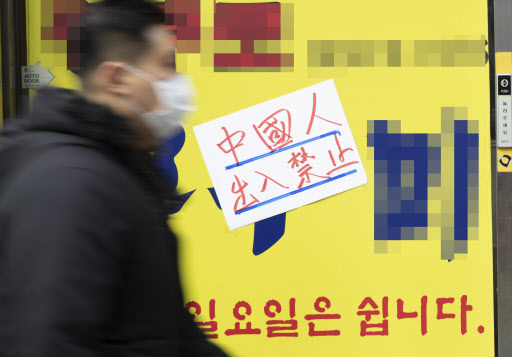Virus fear sparks China phobia in S. Korea

The entrance to a seafood restaurant in downtown Seoul bears a sign that reads “No Chinese allowed” in red Chinese characters on Jan. 29. (Yonhap)
SEOUL — Public fears over the novel coronavirus that originated in Wuhan, China, are prompting many South Koreans to avoid Chinese people all together.
As Koreans lock themselves up at home and shun places where they could run into Chinese people, shopping districts and sightseeing spots popular among Chinese tourists as well as neighborhoods with a large population of ethnic Korean-Chinese are unusually quiet and empty. Some Koreans even fear going to restaurants likely to be staffed with ethnic Korean-Chinese or language lessons taught by native Chinese teachers.
“Those who have babies say they don’t even go to Chinese restaurants because they are likely to have Chinese staffers serving food,” said a mother of 10-month-old infant, surnamed Shim.
“It is not that every Chinese is infected with the virus, but many of them might have visited their hometown during the Lunar New Year’s holiday and we don’t know when they came back to Korea,” she said. “There is no harm in being careful.”
Another Korean echoed the view.
Article continues after this advertisement“I don’t go to tourist spots such as Gyeongbokgung Palace — a popular destination for Chinese visitors — with my children. Who knows (who might be carrying the virus)?” said a woman who wanted to be identified only by her surname Kang.
Article continues after this advertisementAn official from the Chinese language school in central Seoul said on condition of anonymity that some people who signed up for classes have requested a suspension of their lessons for the month of February.
The death toll from the virus is nearly 500 in China, with over 24,000 people infected. As of Wednesday afternoon, Korea has 18 confirmed cases of the virus. Of them, 15 people are Koreans and nine visited Wuhan, the epicenter of the outbreak.
China accounts for the largest share of Korea’s foreign population, with over 1 million Chinese, including those of Korean descent, registered as of 2018.
The Korean government on Tuesday enforced a ban on entry of people traveling from the Chinese province of Hubei, where Wuhan is located, but it did little to ease public concerns. Many demand the government should block all Chinese.
Before the outbreak, the average daily arrivals from China stood at around 30,000, including Koreans returning from a trip there.
“I am not happy with the government as it imposed an entry ban so late and only on those traveling from (Hubei),” Kang said.
Fears have become even more real for university students who take classes and live in dormitories with Chinese students who are set to return to the campus after a winter vacation.
“It is not like I hate or despise Chinese classmates, but I would feel uncomfortable around them (back on campus) because the virus originated from China,” said Park Jun-hee, 22-year-old university student in Seoul. “Especially if they don’t wear protective masks and follow even basic rules.”
There were some 71,067 Chinese students in Korea as of April 2019, accounting for 44.4 percent of all foreign students here, according to Korean Educational Development Institute. Most of them are enrolled in universities in Seoul, with Kyunghee University having the highest number at 3,839.
Some schools including Kyunghee University and Yonsei University canceled school events such as graduation and entrance ceremonies to prevent mass gatherings of students. Some 340 kindergartens, elementary, middle and high schools suspended classes or have delayed reopening, according to the Ministry of Education.
Anxiety over the spread of the coronavirus led to prejudice toward or discrimination against Chinese people online and offline.
A restaurant in central Seoul became the subject of criticism last week after putting up a notice on its door reading “no Chinese allowed.”
A labor union for delivery workers also came under fire and had to issue an apology last week after they asked their employer to pay them danger allowance for delivering food to areas populated with ethnic Korean-Chinese.
Online communities have also been flooded with questions about whether it is okay to continue getting help from ethnic Korean-Chinese babysitters or caregivers for the sick.
For more news about the novel coronavirus click here.
What you need to know about Coronavirus.
For more information on COVID-19, call the DOH Hotline: (02) 86517800 local 1149/1150.
The Inquirer Foundation supports our healthcare frontliners and is still accepting cash donations to be deposited at Banco de Oro (BDO) current account #007960018860 or donate through PayMaya using this link.